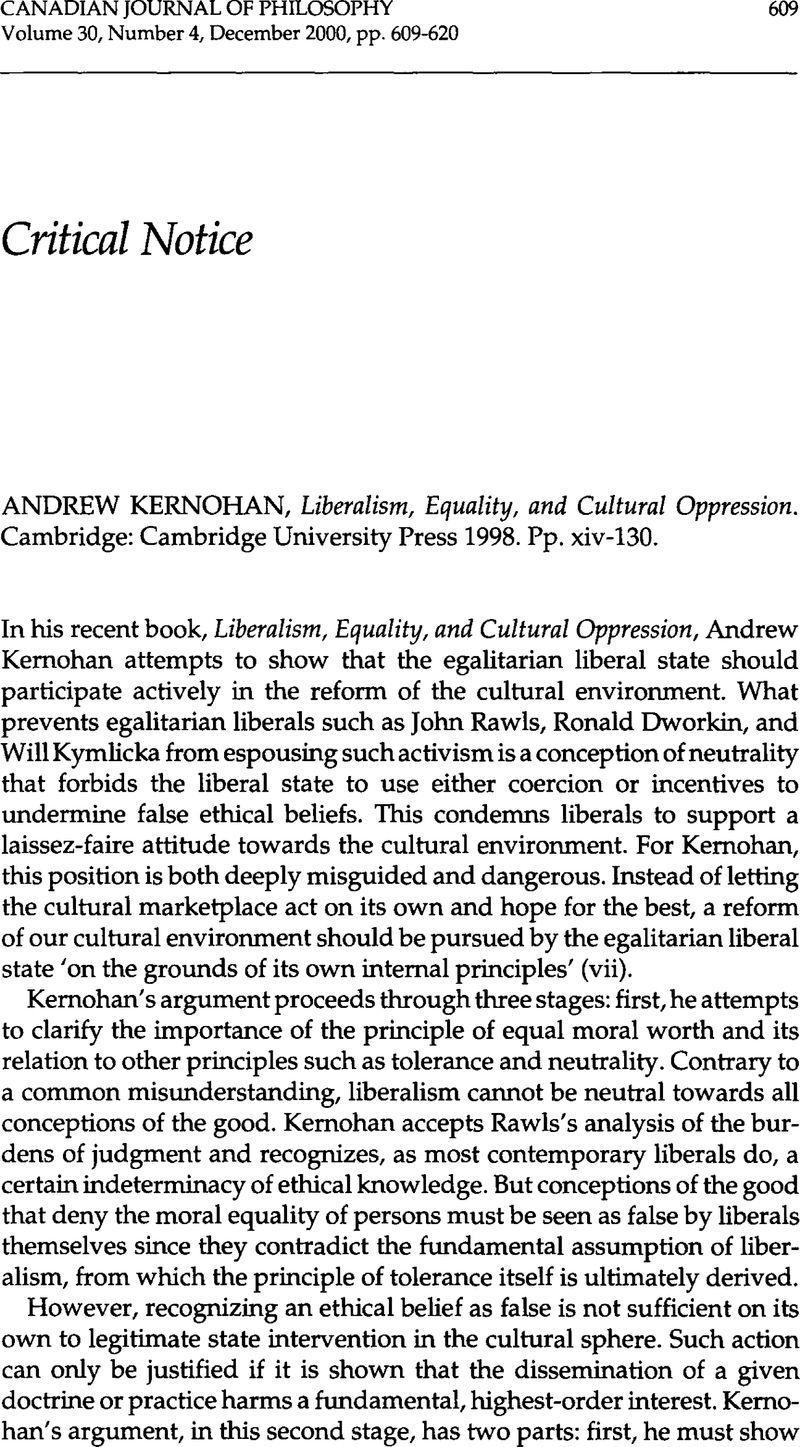No CrossRef data available.
Published online by Cambridge University Press: 01 January 2020

1 Kernohan (20) is basing his interpretation of Kymlicka on the following passage taken from Liberalism, Community and Culture: ‘Liberals say that we should be free to accept or reject particular options presented to us, so that, ultimately, the beliefs we continue to hold are the ones that we've chosen to accept. But the range of options can't be chosen …. The decision about how to lead our lives must ultimately be ours alone, but this decision is always a matter of selecting what we believe to be the most valuable from the various options available, selecting from a context of choice which provides us with different ways of life. This is important because the range of options is determined by our cultural heritage’ (Kymlicka, Will Liberalism, Community, and Culture [Oxford: Clarendon Press 1989], 164–5)Google Scholar.
2 Indeed, I think that Kymlicka basically agrees with Kemohan that culture ‘provides us the background beliefs on which our deliberation depends’ (21), as the passage quoted in the previous note shows. Even Kemohan's second interpretation of Kyrnlicka inappropriately weakens his understanding of a context of choice, thus overstating what truly separates them. Their actual disagreement lies in the conclusion they draw from their understanding of the role of culture in the formation of an individual's conception of the good. Kymlicka still wants to emphasize the possibility of deliberative choice, whereas Kemohan wishes to downplay it.
3 He writes the following: ‘though it likely is true for each of our background beliefs that we could evaluate it and take responsibility for it if we were motivated to do so, it does not follow that we could evaluate all of our background beliefs’ (22).
4 Kymlicka, Will Contemporary Political Philosophy (Oxford: Clarendon Press 1990), 207–16Google Scholar
5 This is what Kernohan seems to be supposing in his discussion of the debate between Ronald Dworkin and Catharine MacKinnon (94-6). The thriving pornography in our society is assumed to show that simply ensuring an equal access to the public sphere is not enough to fight the harm wrought by pornography. This would be the case only if we considered that pornographic activities constitute a harm in themselves. This might be correct if we defined the harm created by such activities in terms of women's self-respect. But that is not what Kernohan wants to argue. He wants to show how such activities constitute an accumulative harm to our interest to know our good.
6 See for instance Callan, Eamonn Creating Citizens: Political Education and Liberal Democracy (Oxford: Clarendon Press 1997)CrossRefGoogle Scholar, especially chapters 7 and 8.
7 On the liberal side, see, for instance, Macedo, Stephen Liberal Virtues: Citizenship, Virtue and Community in Liberal Constitutionalism (Oxford: Clarendon Press 1990)Google Scholar or Eamonn Callan, Creating Citizens.
8 Kemohan's analysis would be convincing in the case of illiberal/inegalitarian minorities inside liberal states which are able to close themselves off from mainstream society.
9 Taylor, C. ‘The Politics of Recognition,’ in Multiculturalism and ‘The Politics of Recognition’ (Princeton: Princeton University Press 1992) 25–75Google Scholar
10 Taylor, drawing on the debate around the ‘langue d'affichage’ in Québec, makes a distinction between means that would constitute a direct breach of fundamental principles such as freedom of expression etc., and those that would only contradict the conception of neutrality defended by what he calls procedural liberalism. According to him, the relevant sections of Bill 101 constituted a breach of the latter but not of the former.
11 Habermas, J. ‘Struggles for Recognition in Constitutional States,’ European Journal of Philosophy 1 (1993) 128–55CrossRefGoogle Scholar